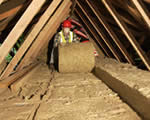 Go to main content
Go to main content
Archive Website of the UK government
Please note that this website has a UK government accesskeys system.
Main menu
Page menu
Environment and greener living

Insulation and heating

Eighty per cent of energy used in homes is for heating. Turning down your thermostat, installing good insulation and getting a more efficient boiler can help cut your fuel bills and your carbon emissions. Financial support is also available to make your home more energy efficient.
The wider issue
Energy used in the home is responsible for more than a quarter of the UK's carbon dioxide emissions. Reducing the amount of energy you use for heating is one of the most important things you can do to help reduce climate change.
Financial help to make your home energy efficient
You can get financial help if you're planning on making energy saving improvements – like installing insulation or getting a new boiler – to your home.
Warm front
If you’re on certain benefits, you may be eligible for a Warm Front grant. This helps you make improvements to your insulation and heating. To find out more, read ‘Warm front scheme in England’.
Help from energy suppliers
You may also be eligible for energy saving offers from energy companies. You can take up offers from any of the companies making the offers, regardless of who supplies your gas and electricity. Find out exactly what support you could receive by using the ‘energy saving offers: do you qualify?’ link below.
Landlord's Energy Saving Allowance
If you're a landlord and make energy saving improvements to your property, you could claim the Landlord's Energy Savings Allowance (LESA) and lower your tax bill. Follow the LESA link for more information.
Take control of your heating

Turn down your thermostat to save money and fuel
You can cut a surprising amount of wasted energy with clever use of your central heating controls. These can include:
- thermostats for heating and hot water
- radiator valves with thermostats included
- electronic timers
Taking a few simple steps can save you money and reduce your carbon footprint:
- use the timer to make sure the heating is only on when you need it
- when you move house, ask the landlord or the people moving out to show you how the controls work
- if you're having a new boiler or hot water cylinder put in, ask the person installing it to talk you through the controls - and ask for a follow-up visit
- try turning the room thermostat down by just one degree Celsius - you could save as much as 10 per cent on your heating bills
Choose an energy efficient boiler
More than 80 per cent of home energy use is for heating and hot water - so getting a more energy efficient boiler can make a big difference. Look out for the Energy Saving Trust Recommended label when you're choosing a new boiler. This label can only be used on the most energy efficient products, usually the top 20 per cent of those available.
Insulate your walls and loft

Is your loft insulation 270 millimetres thick?
More than half the heat lost in an uninsulated home escapes through the walls or the roof. Installing loft insulation could save you up to £225 a year and installing cavity wall insulation could save you £110 a year on average.
Cavity wall insulation
Installing cavity wall insulation can take just a couple of hours for a typical three-bedroom house, and can be done from the outside. Your building needs to have cavity walls. You can insulate solid walls too, but this is a bigger and more costly job to do.
Loft insulation
Loft insulation is easy to install - you can even do it yourself. If you already have loft insulation, check how thick it is. Adding another layer to bring it up to the recommended 270 millimetres will save both energy and money being wasted.
Other ways to keep the heat in
Walls and roofs are the biggest heat loss culprits, but you don't have to stop there:
- double glazing can cut heat loss through windows by half
- insulate your hot-water tank
- lag your pipes
- put draught-proofing strips round windows and doors - if you can feel cold air coming in, it means warm air is going out the same way
- if your home has a cellar space, under-floor insulation can help keep the warmth in
The link 'Energy efficient glazing' advises you on which kinds of windows are best for you and how to find a registered installer. To find out if you're eligible for an energy saving grant, which may cover windows, call the ACT ON CO2 helpline on 0800 512012.
Think about renewable energy sources for your heating
Renewable energy can sometimes be an option for both heating and powering homes. The most common renewable energy technologies are solar, wind, water (hydro) and wood fuel. Using renewable energy can make a significant contribution to reducing climate change effects.
 Facebook
Facebook Twitter
Twitter StumbleUpon
StumbleUpon Delicious
Delicious Reddit
Reddit